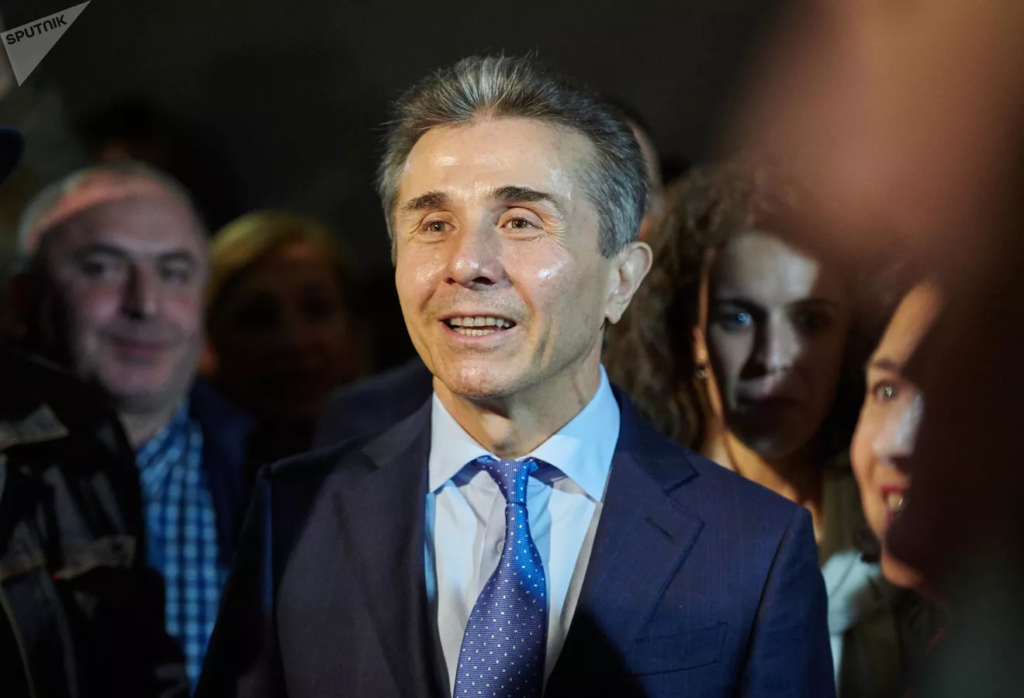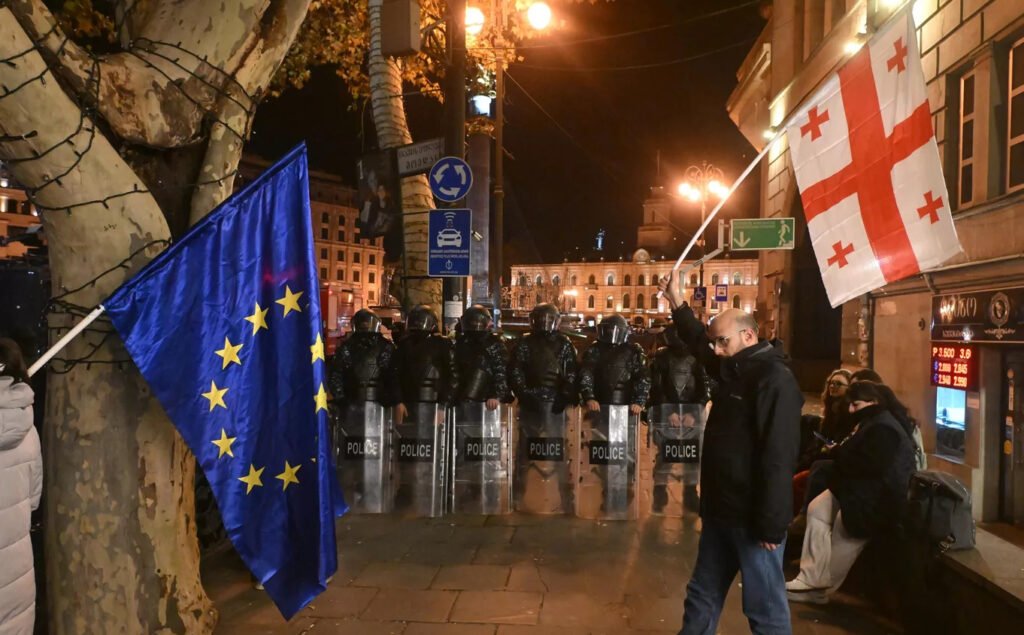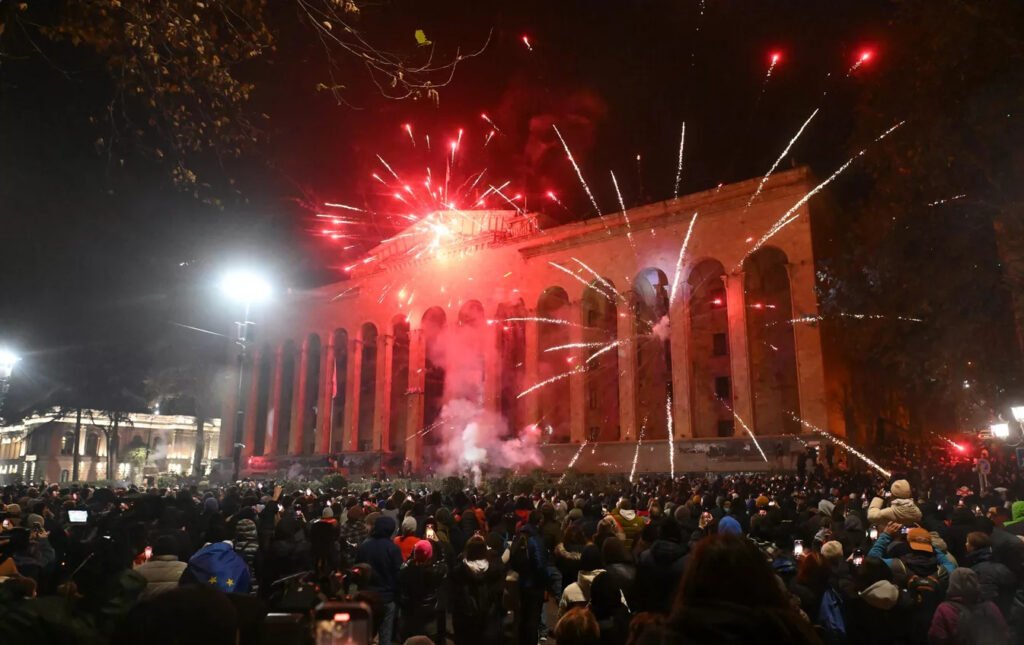Tbilisi Protests: Georgia at the Crossroads of Imperial Ambitions
For nearly two weeks, protests have gripped Tbilisi, Georgia’s capital, with demonstrators waving Georgian and European Union flags. The protesters accuse the ruling Georgian Dream party of being “pro-Russian,” a claim eagerly amplified by Western politicians who view the unrest as an opportunity to draw Georgia further into their sphere of influence—all in the name of “democracy.”
Western Imperialism in Georgia
Like many post-Soviet nations, Georgia’s politics are dominated by competing cliques of oligarchs, who differ mainly in their degree of allegiance to Western imperialism. Both the ruling Georgian Dream party and the opposition, led by the United National Movement (UNM), publicly support EU membership, with Georgian Dream even enshrining this goal in the constitution in 2017.
Despite this, the opposition accuses Georgian Dream and its founder, billionaire Bidzina Ivanishvili, of being “pro-Russian” due to their efforts to ease tensions with Moscow following Georgia’s crushing defeat in the 2008 war. Over the years, the issue of relations with Russia has repeatedly been used as a rallying point for opposition protests, led by a coalition of nationalist and liberal Russophobes. While these demonstrations attract workers and citizens hopeful for the “prosperity” promised by EU integration, the movement’s leadership remains reactionary.
Initially, Georgian Dream aligned itself with pro-Western policies, including advocating for NATO membership. However, since the onset of the Ukraine war in 2022, the party has distanced itself from the West, with Prime Minister Irakli Kobakhidze denouncing the “Global Party of Warmongers” for allegedly trying to draw Georgia into the conflict against Russia. Relations between Tbilisi and Kyiv further soured after Georgian authorities accused Ukrainian intelligence of smuggling explosives into Russia, a charge Ukraine has not fully denied.


The Controversial “Foreign Agent” Law
In May, tensions with the West escalated when Georgia passed a “Foreign Agent” law requiring NGOs and media outlets receiving over 20% of their funding from abroad to register as “foreign influence agents.” The government argued this was necessary to curb the influence of Western-funded organizations meddling in Georgian politics. The law, however, was met with sharp criticism from the opposition, who labeled it a replica of Russian legislation and an attack on democracy.
Adding fuel to the fire, Georgian Dream also passed a law curtailing LGBTQ rights to appeal to conservative sections of society. This has led the opposition, known for its own history of suppressing dissent during its rule from 2003 to 2012, to position itself as a champion of democracy, despite its track record of violent crackdowns, economic austerity, and disastrous policies such as the 2008 war with Russia. Ironically, the opposition’s leader, former president Mikheil Saakashvili, is now imprisoned for abuse of power.
The Imperialist Playbook
The October elections, which saw Georgian Dream secure 50% of the vote, were a turning point. The opposition, divided between the UNM and the newly formed Coalition for Change, accused the government of election fraud without providing concrete evidence. The European Parliament added its voice, calling for new elections under international supervision, despite a lack of credible proof. In response, Kobakhidze announced a suspension of EU accession talks until 2028, citing “blackmail” from European leaders.
Western-backed opposition forces have since refused to recognize the election results, boycotted parliament, and called for the government’s ouster through mass protests. Their grievances include recent parliamentary reforms that changed the election of the president—a largely ceremonial role—from direct voting to an indirect process.

This move was seen as a response to current pro-Western president Salome Zourabichvili, a former French diplomat who has accused Georgian Dream of being part of a “Russian operation,” without presenting evidence.
The protests have remained largely peaceful, but the government alleges the involvement of “foreign instructors” among the demonstrators. Dozens of arrests have followed, prompting sanctions and threats from the EU and the United States. The hypocrisy of these sanctions is glaring: while condemning Georgia’s government, Western leaders remain silent on atrocities committed by their allies, such as Israel’s actions in Gaza and the despotic regimes in Saudi Arabia. Politicians like Emmanuel Macron and Ursula von der Leyen speak of “democratic values” while openly supporting opposition parties that lost the elections and conspiring to overthrow a sovereign government.

Echoes of Ukraine 2014
The current situation in Georgia bears striking similarities to Ukraine’s 2014 Maidan uprising, when the United States and its European allies orchestrated a movement to unseat a leader deemed insufficiently compliant with their interests. That intervention plunged Ukraine into civil war, fostered the rise of neo-Nazi militias, and paved the way for the current proxy war between NATO and Russia, which has claimed hundreds of thousands of lives.
These events reveal what Western powers mean by “democracy.” When a country elects leaders who challenge Western hegemony, those elections are dismissed as mistakes to be corrected—whether through diplomatic pressure, “color revolutions,” sanctions, or even military intervention. The goal is not freedom or prosperity for nations like Georgia but the exploitation of their resources and labor, and their transformation into geopolitical pawns in the West’s rivalry with Russia.

The crisis in Georgia, like others in Eastern Europe, is a direct consequence of the Soviet Union’s collapse, which enabled oligarchs to plunder state resources with the support of Western imperialists. Neither subjugation to Western powers nor alignment with Russia offers a solution for the Georgian people. True liberation requires reviving the revolutionary spirit of 1917, when the Bolsheviks sought to dismantle imperialist structures and establish a system centered on workers’ control and social justice.
As Western powers continue to meddle in Georgia’s affairs under the guise of democracy, it is crucial to recognize their actions for what they are: efforts to secure strategic dominance, no matter the cost to the Georgian people. The task ahead is monumental but clear—overcoming imperial domination and rebuilding a society that prioritizes the needs and aspirations of its people.

